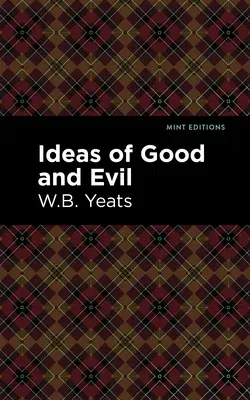Ideas of Good and Evil (1903) is a collection of wide-ranging essays
by Irish poet W.B. Yeats. Writing on such subjects as the art of poetry,
politics, and the occult, Yeats proves himself to be not only a master
of verse and drama, but an immensely talented essayist and thorough
scholar.
"What is 'Popular Poetry'?" reflects on a changing Irish literary
landscape which has, over the course of Yeats' career, established its
own place in world literature apart from, and perhaps surpassing, its
English counterpart. Juxtaposing "the poetry of the coteries, which
presupposes the written tradition" and "the true poetry of the people,
which presupposes the unwritten tradition," Yeats argues that the spirit
of Irish poetry depends on its unfaltering connection to the itinerant
bards and storytellers whose gift for musicality and memory kept
language alive for a widely illiterate people. In "Magic," Yeats, a
longtime member of the Hermetic Order of the Golden Dawn, discusses his
belief in the occult. Musing on the power of symbol to evoke memories,
as well as the revelation of his past lives, Yeats provides personal
anecdotes and secondhand accounts of magical occurrences and
experiences, exposing a world secrets and hidden meaning for believers
and the uninitiated alike. "The Philosophy of Shelley's Poetry" is an
academic essay in which Yeats argues that Shelley's poems far surpass
the radical ideologies of such figures as William Godwin. Ideas of Good
and Evil showcases the diverse intellectual and spiritual interests of
W.B. Yeats, an icon of Irish literature and one of the twentieth
century's leading poetic voices.
With a beautifully designed cover and professionally typeset manuscript,
this edition of W.B. Yeats's Ideas of Good and Evil is a classic of
Irish literature reimagined for modern readers.


